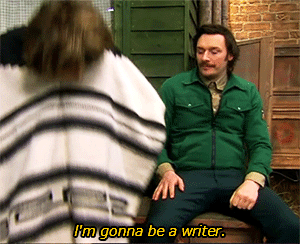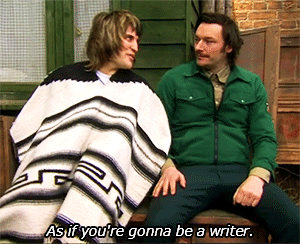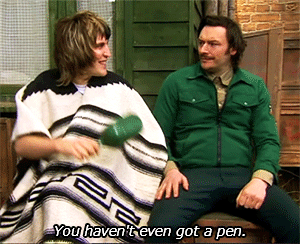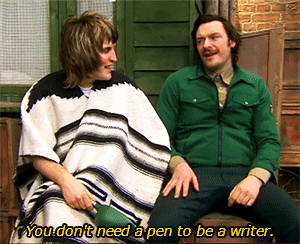Short stories, poems and works featuring original characters and some familiar faces.
Don't wanna be here? Send us removal request.
Quote
my mother says: when they hurt you, and they will, eventually, hurt you - take it back. when he calls you words that make your skin crawl, stand taller, my love, lying down in a hole is how you become a gravesite, and he deserves no honor like writing your epithet when they don’t see you as a leader, find how to guide from inside the operation, my love, a mouse can level a house if it learns which beam to gnaw when you try to speak and are silenced; remember this: most language is through our bodies and like language, our rage has a way of coming out even when our tongues are stilled - no witchfires stopped us, no rocks drowned us: you cannot kill what is endless. when they hurt you, and they will hurt you, remember to be the trees of your grandmothers; we are sap sisters and it is so easy to forget that amber’s embrace is forever; no woman on this planet is entirely broken - you cannot break lightning, from stone comes more stone, from the edge of the ocean we at once rose when they hit you, turn no cheek when they hate you, live a revengefully happy life when they send you to hell, learn to love heat when they send you to the kitchen, pick up a knife.
even the worm turns // r.i.d (via inkskinned)
4K notes
·
View notes
Text
Reblog if you write fic and people can inbox you random-ass questions about your stories, itemized number lists be damned.
130K notes
·
View notes
Photo
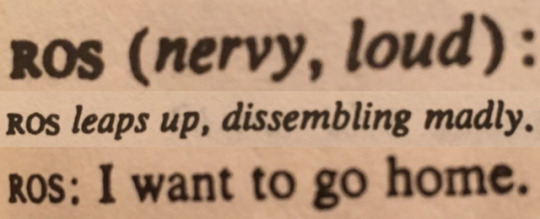
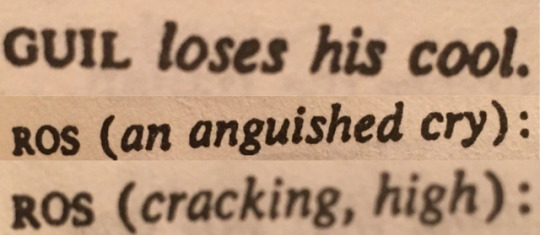
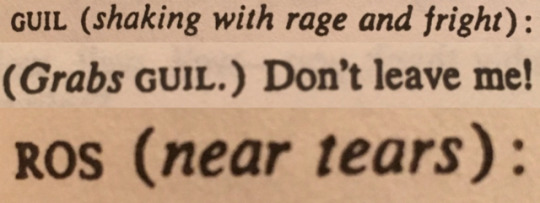
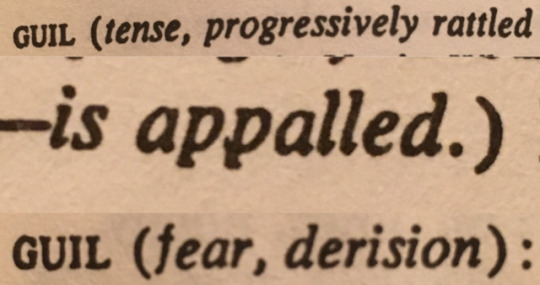

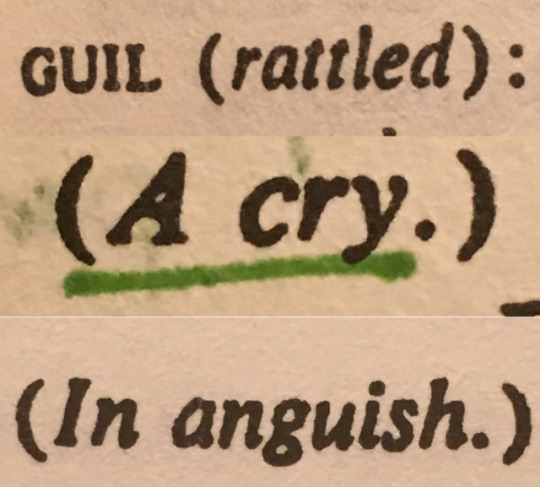
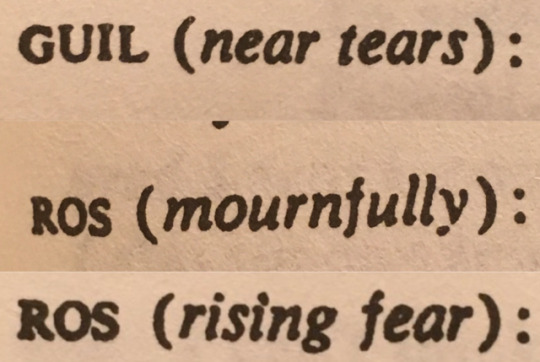
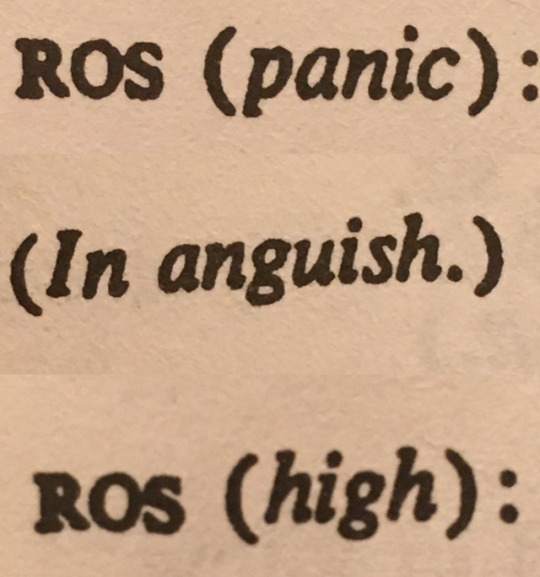
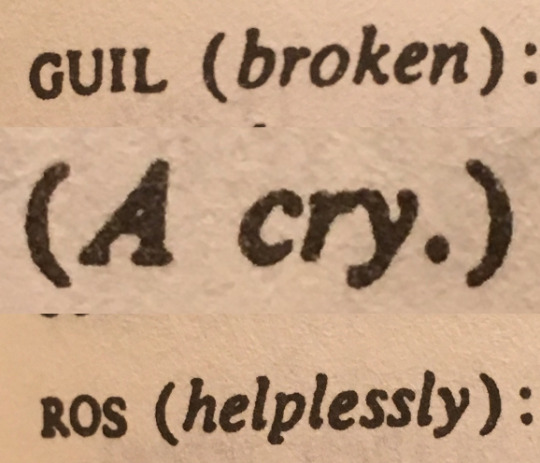
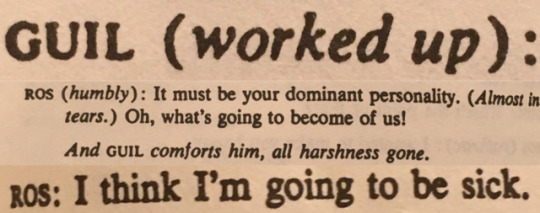
Rosencrantz & Guildenstern are sad- a compilation
431 notes
·
View notes
Note
Hello! You recently posted, "Sometimes Shakespeare puts speeches into the mouths of characters who can’t possibly realise the full import of what they’re saying (as is the case with Shylock’s ‘hath not a Jew eyes?’ speech)." What makes you say that Shylock wouldn't recognize the full import of what he's saying? Isn't his intent to justify his actions and try to show the Christians that they cannot blame him for becoming what they've made him?
I did think I passed over quite a big idea rather quickly when I wrote it, but I didn’t have space to explain it in that post.
I’ll quote the speech here for reference:
Hath not a Jew eyes? Hath not a Jew hands, organs, dimensions, senses, affections, passions? Fed with the same food, hurt with the same weapons, subject to the same diseases, healed by the same means, warmed and cooled by the same winter and summer as a Christian is? If you prick us do we not bleed? If you tickle us do we not laugh? if you poison us do we not die? And if you wrong us shall we not revenge? If we are like you in the rest, we will resemble you in that. If a Jew wrong a Christian, what is his humility? Revenge! If a Christian wrong a Jew, what should his sufferance be by Christian example? Why, revenge! The villainy you teach me I will execute, and it shall go hard but I will better the instruction. (3.1.53-66)
The reason I say that Shylock doesn’t realise the full import of what he’s saying is because I think the monologue goes beyond the simple justification of his actions that Shylock intends it to be. That’s definitely one of the meanings of the speech, but it’s not all. Shylock reasons that he and the Christians in the play share the same corporeal existence, senses, feelings and desires, things that make them equally human and that give them the same weaknesses. He evokes an image of absolute human equality which transcends the boundaries of race, colour, religion and any other kind of discrimination. So far, so good.
The limitations of Shylock’s own understanding of what he’s said shows when he makes this argument a justification for his equal capability for violence and revenge. Having just shown how any form of cruelty is unjustifiable based on the fact of the fundamental physical similarity that we all share as human beings, he tries to use it to justify his own cruelty and inhumanity.
The way I see it, there are always two distinct viewpoints at play in Shakespeare’s dramas: there’s the viewpoint of the characters, who have their own (often rather limited) motivations, desires, and beliefs; then there’s the viewpoint of the play, which generally operates at a level the characters in the play are unaware of. In Shylock’s case, the perspective of the character is the justification of his actions based on the treatment he has received, but the perspective of the play shows a vision of absolute equality, a way of thinking that would prevent all the strife that plays out in The Merchant of Venice. I think that the fact that the speech is remembered for its egalitarianism rather than as a justification of revenge shows that the audience has grasped the greater import of what Shylock is saying, perhaps better than Shylock himself.

89 notes
·
View notes
Video
youtube
Royal Shakespeare Company Artistic Director Gregory Doran speaks about approaching the history in Shakespeare’s history plays
33 notes
·
View notes
Text
Alternatives for 25 overused words in writing
1. Interesting- note worthy; thought-provoking; fascinating; attracting; appealing; attention-grabbing; captivating; gripping; invigorating; engrossing; engaging; electrifying.
2. Beautiful- striking; stunning; magnificent; lovely; charming; gorgeous; radiant; dazzling.
3. Good- acceptable, wonderful, exceptional; positive; brilliant; first-rate; notable; stellar; favorable; superb; marvellous; prime.
4. Bad- awful; lousy; poor; unacceptable; crummy; dreadful; rough; inferior; substandard; atrocious; appalling; dreadful; defective.
5. Look- glance; fixate; observe; stare; gaze; peer; scan; watch; study; browse; eye; glimpse; review; inspect.
6. Nice- lovely; superior; pleasant; satisfying; delightful; likeable; agreeable; correct; adequate; swell; fair; okay; approved.
7. Very- extremely; exceedingly; exceptionally; immensely; tremendously; abundantly; particularly; remarkably.
8. Fine- satisfactory; worthy; respectable; exquisite; suitable; well; imposing; decent; admirable; praise-worthy; decent.
9. Happy- cheerful; delighted; pleased; content; amused; thrilled; elated; thrilled; ecstatic; on cloud 9.
10. Really- genuinely; truly; honestly; actually; undoubtedly; certainly; remarkably; incredibly; downright; unquestionably; extremely.
11. Sad- miserable; gloomy; devastated; down at heard; distraught; distressed; dispirited; sorrowful; downcast; feeling blue; desolate.
12. Big- massive; huge; giant; gigantic; enormous; large; colossal; immense; bulky; tremendous; hefty; sizable; extensive; great; substantial.
13. Shocked- taken aback; lost for words; flabbergasted; staggered; outraged; astonished; astounded; stunned; speechless; appalled.
14. Small- tiny; petite; mini; miniature; microscopic; minuscule; compact; pocket-sized; cramped; puny; undersized; limited; meager; modest; minute; pint-sized.
15. Angry- irate; enraged; touchy; cross; resentful; indignant; infuriated; wound-up; worked-up; seething; raging; heated; bitter; bad-tempered; offended; frustrated.
16. Know- understand; comprehend; realize; learn; perceive; recognize; grasp; sense.
17. Change- alter; transform; replace; diversify; adjust; adapt; modify; remodel; vary; evolve; transfigure; redesign; refashion; advance; transition; shift; adjustment.
18. Old- aged; ancient; matured; elderly; senior; veteran; decrepit; seasoned; venerable; past one’s prime; doddering; senile.
19. Think- ponder; reflect; conceive; imagine; contemplate; consider; determine; realize; visualize; guess/assume; conclude; envision.
20. Funny- comical; ludicrous; amusing; droll; entertaining; absurd; hilarious; silly; whimsical; hysterical; joking; witty; facetious; slapstick; side-splitting; knee-slapping.
21. Go- move; proceed; advance; progress; travel; walk; journey; depart; exit; flee; make one’s way; clear out; get underway.
22. Give- grant; donate; hand-out; present; provide; deliver; hand over; offer; award; bestow; supply with; contribute to; send; entrust.
23. Get- acquire; obtain; receive; gain; earn; gather; collect; buy; purchase; attain; score; secure; take possession of; grab.
24. Easy- effortless; simple; clear; smooth; straightforward; uncomplicated; painless; accessible; apparent; basic; plain; child’s play; facile; elementary; cinch.
25. Fast- agile; brisk; rapid; nimble; swift; accelerated; fleeting; high-speed; active; dashing; winged; hurried; turbo.
133K notes
·
View notes
Text
Synonyms For Very
This masterlist is a masterlist of words that you may use alongside the word very, very being one of the most common words that are used when writing. I hope this helps you as much as it helps me in our writing seem more sophisticated and unique.
A:
Very accurate - exact Very afraid - fearful Very angry - furious Very annoying - exasperating
B:
Very bad - atrocious Very beautiful - exquisite Very big - immense Very boring - dull Very bright - luminous Very busy - swamped
C:
Very calm - serene Very careful - cautious Very cheap - stingy Very clean - spotless Very clear - obvious Very clever - intelligent Very cold - freezing Very colourful - vibrant Very competitive - cutthroat Very complete - comprehensive Very confused - perplexed Very conventional - conservative Very creative - innovative Very crowded - bustling Very cute - adorable
D:
Very dangerous - perilous Very dear - cherished Very deep - profound Very depressed - despondent Very detailed - meticulous Very different - disparate Very difficult - arduous Very dirty - filthy Very dry - arid Very dull - tedious
E:
Very eager - keen Very easy - effortless Very empty - desolate Very excited - thrilled Very exciting - exhilarating Very expensive - costly
F:
Very fancy - lavish Very fast - swift Very fat - obese Very friendly - amiable Very frightened - alarmed Very frightening - terrifying Very funny - hilarious
G:
Very glad - overjoyed Very good - excellent Very great - terrific
H:
Very happy - ecstatic Very hard - difficult Very hard-to-find - rare Very heavy - leaden Very high - soaring Very hot - sweltering Very huge - colossal Very hungry - ravenous Very hurt - battered
I:
Very important - crucial Very intelligent - brilliant Very interesting - captivating
J:
K:
L:
Very large - huge Very lazy - indolent Very little - tiny Very lively - vivacious Very long - extensive Very long-term - enduring Very loose - slack Very loud - thunderous Very loved - adored
M:
Very mean - cruel Very messy - slovenly
N:
Very neat - immaculate Very necessary - essential Very nervous - apprehensive Very nice - kind Very noisy - deafening
O:
Very often - frequently Very old - ancient Very old-fashioned - archaic Very open - transparent
P:
Very painful - excruciating Very pale - ashen Very perfect - flawless Very poor - destitute Very powerful - compelling Very pretty - beautiful
Q:
Very quick - rapid Very quiet - hushed
R:
Very rainy - pouring Very rich - wealthy
S:
Very sad - sorrowful Very scared - petrified Very scary - chilling Very serious - grave Very sharp - keen Very shiny - gleaming Very short - brief Very shy - timid Very simple - basic Very skinny - skeletal Very slow - sluggish Very small - petite Very smart - intelligent Very smelly - pungent Very smooth - sleek Very soft - downy Very sorry - apologetic Very special - exceptional Very strong - forceful Very stupid - idiotic Very sure - certain Very sweet - thoughtful
T:
Very talented - gifted Very tall - towering Very tasty - delicious Very thirsty - parched Very tight - constricting Very tiny - minuscule Very tired - exhausted
U:
Very ugly - hideous Very unhappy - miserable Very upset - distraught
V:
W:
Very warm - hot Very weak - frail Very well-to-do - wealthy Very wet - soaked Very wide - expansive Very willing - eager Very windy - blustery Very wise - sage Very worried - distressed
X:
Y:
Z:
A/N: If you know of anymore words I can add please message me.
157K notes
·
View notes
Text
Congratulations, genius. You convinced your best friend, the Protagonist, not to marry the story’s Love Interest, and instead go off and have awesome adventures with you forever. But in doing so, you pissed off the Author.
38K notes
·
View notes
Video
instagram
SOUND UP! I thought perhaps a little Shakespeare would cheer me up, so Sonnet 29 it is…
1 note
·
View note
Video
instagram
Stealthy Sonnets; Shakespeare 144… (at Tamsin MARY)
2 notes
·
View notes
Text
A Six Word Shakespeare compilation:
King Lear
Gave away crown. Storm. Everyone dies.
Twelfth Night
Shipwrecks and twins with identity problems.
Othello
No promotion means someone gets smothered.
Midsummer Night’s Dream
Three plots and fairies bungle everything.
Titus Andronicus
Rape, dismemberment, murder, madness, bastards, cannibalism.
Julius Ceasar
Even BBFs will get ya down.
Macbeth
99 problems and witches are three.
Henry IV, Part 1 (by hithertok)
Shallow Hal beats upstart and illegitimacy.
Henry IV, Part 2
Hal is crowned, kicks Falstaff out.
The Merry Wives of Windsor
Falstaff will die soon; laugh now.
Henry V
Kick some French ass; get married.
OR: What do you mean Falstaff died?!
The Merchant of Venice (by hithertok)
No mercy to suitors or Jews.
Much Ado About Nothing
Save real love; create real love.
Taming of the Shrew
Bianca was a bitch all along.
The Tempest
Marooned with a grudge and daughter.
Richard III
Hunchback gets meddling kids, needs horse.
Hamlet
Just listen to the ghost, Hamlet.
Winter’s Tale
Babies and human statues and bears!
Love’s Labour’s Lost
It’s an exercise in Murphy’s Law.
Love’s Labour’s Won
Cardenio and I are lost. Help.
As You Like It
It’s like Twelfth Night and Midsummer.
2K notes
·
View notes
Quote
I want quiet thunder I want to see you gasp with your eyes I want to feel your touch without any contact I want quiet thunder
Nicholas A Browne | Prose 25 (via wordsnquotes)
2K notes
·
View notes
Text
I Only Fear...
I only fear senility.
The membrane between my rich internal world,
And my slightly frayed reality will decay.
All my secrets will spill out,
And I won’t know enough anatomy to stitch myself back up.
I will be too honest, too truthful, too brutal,
And you will finally know the whole me.
I only fear death before I die.
@by-lines
0 notes


